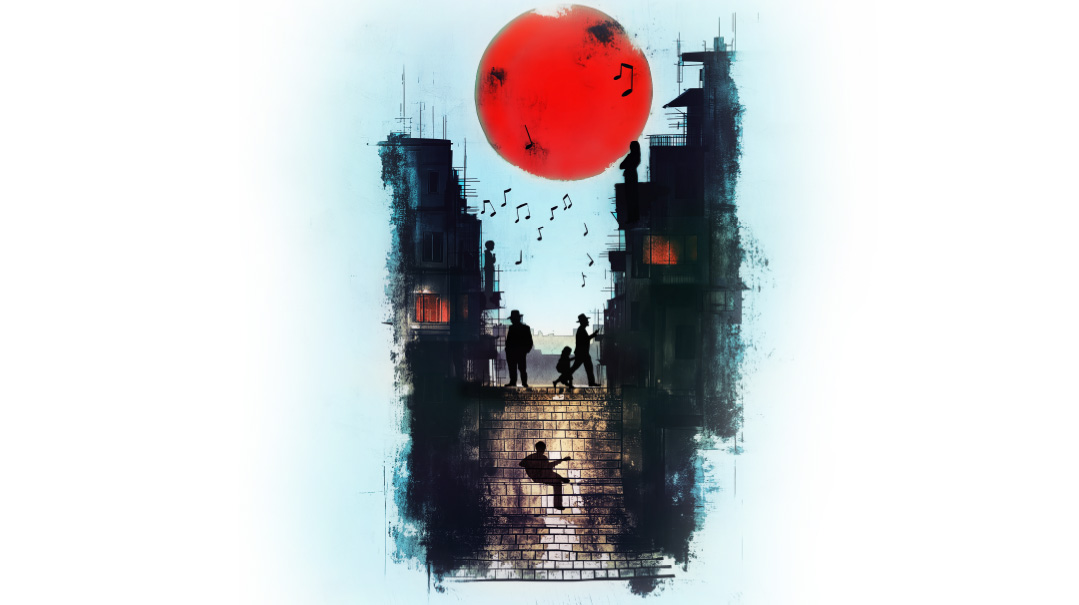Last Stop: Chapter 9
| April 18, 2023“You don’t want these incidents on your record next year. Yeshivahs look at those records when they’re considering boys”

After a night spent in turmoil, the morning feels full of new promise. The world is coated in a light layer of snow, and Naftali feels a sense of peacefulness as he drives his bus out to Meadowbrook.
Even Yudi seems cheerful this morning. His parents are in the driveway when he departs, loading up a taxi for what looks like another trip, and Naftali is pleased to imagine that Yudi has spent the weekend with family. “More skiing?” he asks.
“Nah.” Yudi settles in behind him. “This time, they’re going to the Luxor resort. You couldn’t talk me into going back to Egypt if you tried. I’m the only one going skiing this weekend.” He brightens. “Hey, are you going to be driving any of the buses up to the mountains?”
“Those are coach buses. Hired just for the trip, I assume.” Naftali pats the dashboard. “Where this bus goes is as far as I go.” For now, anyway. Yesterday’s conversation settles back onto him like weight on his shoulders, and his good mood wavers.
Yudi frowns. “That’s too bad,” he says. “Do you think the drivers get free tickets to ski, too? Maybe not.” He considers. “Like, people break arms and legs skiing all the time. I hit a tree once and sprained my wrist. Imagine one of the drivers gets hurt and we’re stranded upstate for Shabbos. Rabbi Hartman would be so mad.” The idea seems to cheer him up.
This is the chattiest that Yudi’s ever been in the morning, and Naftali is quietly amused. There’s something younger about him today, less cynical and more bright-eyed. He isn’t clicking any suspicious-looking items that Naftali might have to confiscate.
As they pick up more boys, though, Yudi’s good mood dissipates. He gets quieter, though not yet moody, and he climbs off the bus and walks into school with his head raised but his eyes gloomy again.
Naftali knows the feeling. He has plans for today, plans that fill him with the same dread, and the sight of the school in front of him makes his gut clench.
The preschool route cheers him up a bit, but at the end of it, he’s back at Ohr Gershon, where he has no choice but to try to keep his promise to Chana.
First order of business: sitting down and learning. Naftali’s done his best to keep up with daf yomi via daily shiurim — it’s formed the backdrop of his empty drives — but tackling Gemara on his own is something he hasn’t ventured in years. He isn’t bold enough to do it at home, where Chana will be watching expectantly, but he wanders into the mesivta beis medrash and glances through the shelves. There’s a set of ArtScroll Gemaras on a tall bookcase near the exit, and Naftali picks one at random — Yevamos, absolutely not, he selects a Moed Katan instead — and escapes the room before anyone notices him.
It’s bad enough that he’s still getting looks in the hall. He doesn’t want to see the skepticism on the boys’ faces when they spot the bus driver running off with a Gemara.
Once he’s settled in his office, he places the Gemara down in front of him and begins to learn. He gets in a few good minutes before his attention wanders to a movement outside the window — is that plane flying too low? There must be some dust in the office, he can feel it in his sinuses. There was chicken defrosting in the fridge this morning — what’s Chana planning for dinner? He hopes it’s chicken and rice in the crock pot. There’s nothing like coming home to a house that smells like chicken. It makes it feel like Friday. Maybe they can try a new chicken dish this Shabbos—
With a flash of chagrin, he remembers that he’s supposed to be learning. He’d made it through a decent chunk before he’d been distracted, he thinks — except that when he looks back at the Gemara, he notices that it’s only a few lines.
He has to try harder. He puts a finger on his place, reading the words over and over again until they’re twisting in front of him. They’re easy to read, but they don’t seem to penetrate his mind. He has to reread the line, over and over, until his foot is tapping restlessly against the floor and he’s more exhausted than he ever is on a driving day.
He needs a break. He stands up and wanders out of the office, through the halls of the mesivta. The school is quiet right now. Most boys are in class, a smattering of students moving through the halls to the bathroom or the water fountains. They glance at him and then glance away, and Naftali is relieved to note that the initial pity has shifted to apathy.
Good. There is only so long that any scandal can linger in yeshivah. His girls would probably spend months talking it through. The boys move on quickly, the drama forgotten, but for the aftershocks that still rock through Naftali.
He glances into a classroom and sees the rows of boys learning over Gemaras, swaying back and forth with the rhythm of the words. The sound of them washes over him like a comforting blanket, and he’s filled with a sudden sense of… not love, not when it’s the melody of his struggles, but family. Home. Belonging. He’d never been good at learning Gemara, but he still feels at ease when he hears the chanting, swallowed up in the sense of community that arises with it.
And as he listens, he catches sight of them, spots them immediately with the eye of someone who recognizes their struggles. A boy in the center of the room, doodling spirals along the border of the Gemara. Another in the front, all the way to the side, kicking the leg of his desk instead of following along with the class. A third, head turned and gaze focused on the window. He was one of them as a child. He’s still one of them.
He rounds the corner near the office and notices that Yudi is standing outside a classroom. He’s scowling now, his morning cheer forgotten, and he glares at the wall as a rebbi steps out of the classroom after him.
“It’s enough already,” the rebbi says, frown apparent under a bushy grey beard. “You were out of line.”
Yudi’s voice rises. “I don’t even know what I did—”
“I can tolerate a lot from you in the classroom,” the rebbi says sharply. “But I have zero tolerance for chutzpah. You know exactly what you did.”
Yudi sneers. “Oh, please. You’re just looking for a reason to kick me out,” he says. “Everyone knows that you have it in for me. I barely even rolled my eyes.”
“Enough!” the rebbi barks out, loud enough to draw the attention of someone in the office. Naftali sees the movement in the frosted glass window that faces the hallway first, and he sighs with consternation when he recognizes the form.
Eliezer strides out of the office like an officer ready for war. “Yehuda Stein,” he says, his voice a low rumble. “You know, I really wish I didn’t keep finding you out in the hallway every day.”
Yudi faces him and his eyes are masked with a chill, so different from the animation that fill them on the bus. Naftali watches him. He can see where the edges of Yudi’s mask are pulled taut, where the boy can’t quite hide the defiance with frigidity. “Feel free to switch my class to the other side of the building,” he retorts. “Again.”
Eliezer puts his hands together, rubbing one thumb against the other. Naftali has seen the motion before from him, a silent attempt to retain some patience, and he grimaces. “I don’t think you understand how precarious your position here is,” Eliezer says slowly. “This is the sixth — maybe seventh — incident in Rabbi Alpert’s class this year. There are only so many times we can tolerate it.”
It’s the wrong thing to say to Yudi, Naftali knows. Yudi doesn’t want to be pushed away by more people. He wants nothing more than to be wanted. He stiffens, and he says, “You mean you’re running out of rebbeim who can handle me.” His voice is sharp and caustic, almost mocking. “I’m just a 16-year-old kid. Rabbi Alpert is, like, 70. Shouldn’t he have figured it out by now?”
Rabbi Alpert, still standing by the door, glares at Yudi. Yudi gives him a tight, contemptuous smile in return. Naftali winces.
Eliezer looks thunderous. “Watch yourself,” he snaps. “There will be other consequences.”
“You gonna call my parents? They’re on a flight to Egypt right now.” Yudi lifts his shoulders, still defiant. “They won’t care.”
“They’ll care if this goes on your permanent record,” Eliezer says sharply. Naftali watches his brother regain control of himself in a minute movement, one that he doubts Rabbi Alpert will have caught. Yudi, he’s sure, has seen it.
“Yudi,” Eliezer says, his voice carefully modulated. “You don’t want these incidents on your record next year. Yeshivahs look at those records when they’re considering boys. Yeshivahs speak to the rebbeim.”
Yudi laughs, pugnacious and angry. “You think I’m going to try to get into a yeshivah on your recommendation?”
He says “your” with scathing scorn and Eliezer looks livid again. Naftali, from his vantage point down the hall, can see the explosion before it begins, the stirrings of a blast that will destroy Yudi.
Because he knows Eliezer, knows when Eliezer reaches that no-holds-barred point when he goes for the nuclear, most devastating option. And he is suddenly sure that Eliezer has reached that point — he can see it in his stance, in the flashing of his eyes, from the way his face is purpling under his beard.
Yudi is fighting like someone with nothing left to lose, and Naftali is suddenly afraid for him — for expulsion, for the last foothold that Yudi has to crumble before him.
He steps forward without thinking, determined to defuse the situation.
“Eliezer,” he says, and both Yudi and Eliezer turn to stare at him in disbelief. “Rabbi Hartman,” he amends. “If I could talk to you for a minute—”
“Not now, Naftali,” Eliezer says through gritted teeth. Yudi looks from one to the other, his eyes narrowed.
Naftali doesn’t give up. “This isn’t what he needs,” he says in a low voice. “We’ve talked about this. This isn’t the way—”
He doesn’t know what he thinks he might accomplish, except perhaps distracting Eliezer enough to calm him down before he threatens to expel Yudi. He only knows that he has to try something before it’s too late.
But he realizes he’s made an enormous mistake when Eliezer turns the same glare on him that he had focused on Yudi moments before. It’s stern and commanding, a rebbi’s glower at a recalcitrant student, and Naftali feels at once small and cowed by it.
“Back down,” Eliezer orders, and he makes no effort to calm himself this time. “Let me be the menahel.”
Naftali feels the familiar anger rising within him, anger steeped in shame. Rabbi Alpert is watching him with compassion, and Yudi looks even more enflamed than before. Eliezer turns away from Naftali, his jaw set. Naftali feels small, meaningless, a being taking up too much space in a place that doesn’t want him, and he stands in humiliated silence beside Yudi.
But somehow, in his clumsy attempt, he’d succeeded in diverting Eliezer from the collision course he’d been headed towards into a lesser, equally devastating one. Eliezer straightens, takes a breath, and says, “There will be consequences for your chutzpah. You won’t be going on the ski trip this weekend.”
“What?” Yudi looks astounded, then furious. “You can’t do that! I already paid!”
“The payment will be returned to your parents,” Eliezer says. He seems to gain serenity with every increase of Yudi’s horror, calmer as he faces him now. “The ski trip is a reward for the hard work of our mesivta students, something we can only gift to those we can trust to behave. And you — you haven’t earned an ounce of that trust.”
Yudi stands in the hallway, trembling with rage, and Naftali wants nothing more than to transport him away from here, back to the bus at the beginning of the day when everything had seemed so bright and hopeful.
“You’ll be sorry,” Yudi says, and his voice is dark in a way Naftali has never heard it before. “You’re going to be sorry for doing this to me.”
to be continued…
(Originally featured in Mishpacha, Issue 957)
Oops! We could not locate your form.



